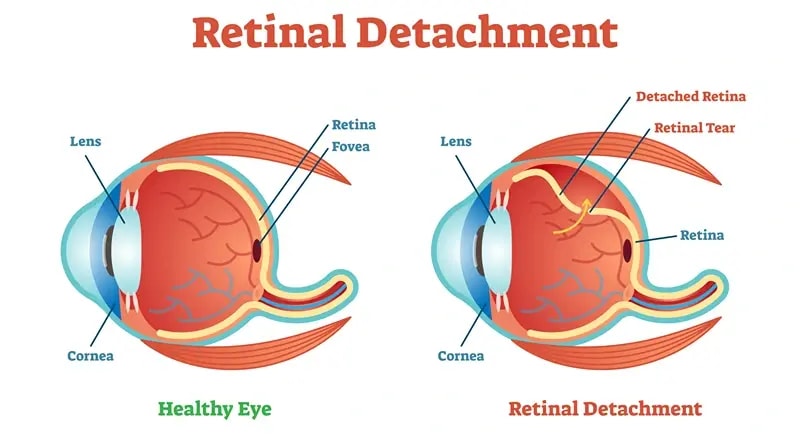Our eyes are among the most delicate organs in the body. They allow us to see and experience the world around us. But sometimes, serious conditions can threaten our vision. One such condition is retinal detachment, which requires urgent care. For people living in or visiting the UAE, Retinal Detachment Surgery in Dubai has become a trusted option because of the city’s advanced medical facilities and highly experienced eye specialists.
In this blog, we will explain what retinal detachment is, why it happens, the warning signs, and the different surgery options available in Dubai. We will also cover what to expect before, during, and after surgery, along with tips on recovery and prevention.
What is Retinal Detachment?
The retina is a thin layer of tissue at the back of your eye that senses light and sends visual signals to the brain. When the retina pulls away from its normal position, it is called retinal detachment. This condition is a medical emergency. Without quick treatment, retinal detachment can lead to permanent vision loss.
Causes of Retinal Detachment
Retinal detachment usually happens when the retina develops a tear or hole. Fluid can then pass through this tear, pushing the retina away from the back wall of the eye. Some common causes include:
-
Aging – The gel-like substance inside the eye, called vitreous, shrinks with age. This can tug on the retina, creating tears.
-
Severe myopia (nearsightedness) – People with high myopia are more likely to experience retinal problems.
-
Eye injuries – Trauma from accidents or sports can lead to retinal tears or detachment.
-
Previous eye surgery – Procedures like cataract surgery may slightly increase the risk.
-
Family history – Genetics can sometimes play a role.
Symptoms of Retinal Detachment
Recognizing the warning signs early is very important. Some of the most common symptoms include:
-
Seeing sudden flashes of light in one or both eyes
-
Noticing a sudden increase in floaters (tiny dark spots or strings in your vision)
-
A shadow or curtain-like effect blocking part of your vision
-
Blurred or distorted vision
If you ever experience these symptoms, you should immediately seek medical attention from an eye specialist.
Diagnosis of Retinal Detachment
An ophthalmologist (eye doctor) can diagnose retinal detachment by examining the inside of the eye. Tests may include:
-
Dilated eye exam – Drops are used to widen the pupil, making it easier for the doctor to look at the retina.
-
Ophthalmoscopy – A special lens and light are used to detect retinal tears or detachments.
-
Ultrasound imaging – Helpful if bleeding inside the eye makes it hard to see the retina.
Treatment: Why Surgery is Necessary
Retinal detachment does not heal on its own. Without surgery, the condition almost always leads to blindness in the affected eye. Fortunately, modern medicine offers several surgical procedures to reattach the retina and restore vision.
Retinal Detachment Surgery Options in Dubai
Dubai is known for its advanced eye care centers, modern technology, and well-trained ophthalmologists. The main surgical options available include:
1. Laser Surgery (Photocoagulation)
If the retina has a small tear or hole but has not yet detached, laser treatment can seal the area. The laser creates small burns around the tear, forming scar tissue that prevents fluid from leaking underneath.
2. Cryopexy (Freezing Treatment)
Similar to laser treatment, cryopexy uses extreme cold instead of heat. The freezing process creates scar tissue that seals the retina back in place. This method is often used for small tears or weak spots.
3. Pneumatic Retinopexy
In this minimally invasive procedure, the surgeon injects a small gas bubble into the eye. The bubble presses the retina back into place against the eye wall. The patient usually needs to maintain a specific head position for several days to help the bubble work effectively.
4. Scleral Buckling Surgery
This is a traditional but highly effective method for more severe detachments. A silicone band (called a scleral buckle) is placed around the eye to push the wall of the eye toward the retina, helping it reattach. The band is not visible and usually stays in place permanently.
5. Vitrectomy
This is one of the most common modern procedures. The surgeon removes the vitreous gel inside the eye and replaces it with gas, air, or silicone oil. This pushes the retina back against the wall of the eye. Over time, the body absorbs the gas or air, while silicone oil may need to be removed later through another procedure.
Which Surgery is Right for You?
The type of surgery depends on several factors:
-
The size and location of the retinal tear
-
How much of the retina has detached
-
Whether the macula (the central part of the retina responsible for sharp vision) is involved
-
The patient’s overall eye health and history
Your ophthalmologist will recommend the best option after a detailed examination.
What to Expect Before Surgery
Before undergoing retinal detachment surgery in Dubai, patients usually:
-
Receive a full eye examination and imaging tests
-
Discuss medical history and current medications with the doctor
-
Get instructions about fasting before surgery if general anesthesia is planned
-
Learn about the risks, benefits, and expected outcomes of the surgery
During the Surgery
The surgery is usually done in a hospital or specialized eye clinic. Depending on the procedure, local or general anesthesia may be used. The operation can take anywhere from 30 minutes to several hours, depending on complexity.
Recovery After Retinal Detachment Surgery
Recovery is a very important part of successful treatment. Here’s what patients can expect:
-
Discomfort and redness – The eye may feel sore, itchy, or sensitive for a few days.
-
Vision changes – Vision might be blurry at first, but it improves gradually.
-
Eye drops – Doctors usually prescribe antibiotic and anti-inflammatory drops to prevent infection and reduce swelling.
-
Head positioning – For pneumatic retinopexy and vitrectomy, patients may need to keep their head in a certain position to help the retina heal properly.
-
Follow-up visits – Regular check-ups are necessary to ensure the retina remains attached and healing is progressing well.
Risks and Complications
Like any surgery, retinal detachment procedures also carry some risks. These may include:
-
Infection
-
Increased eye pressure (glaucoma)
-
Cataract formation
-
Bleeding inside the eye
-
Re-detachment of the retina
However, with modern techniques and expert surgeons in Dubai, these risks are usually well managed.
Living After Retinal Detachment Surgery
Many people regain useful vision after surgery, although results vary depending on how quickly the condition was treated and whether the macula was affected. Some tips for protecting eye health after surgery include:
-
Wearing protective eyewear during sports or physical activities
-
Attending regular eye exams to detect problems early
-
Managing conditions like diabetes and high blood pressure
-
Avoiding heavy lifting or activities that strain the eyes during recovery
Why Dubai is a Leading Choice for Retinal Detachment Surgery
Dubai has become a hub for advanced eye care for several reasons:
-
Access to cutting-edge medical technology and surgical equipment
-
Highly trained and internationally qualified ophthalmologists
-
Modern hospitals and specialized eye clinics
-
Patient-friendly facilities with high standards of safety and care
-
Availability of both routine and emergency services
For people facing urgent eye conditions like retinal detachment, timely access to world-class treatment in Dubai can make a life-changing difference.
Conclusion
Retinal detachment is a serious condition that requires immediate medical attention. Thankfully, patients have access to advanced Retinal Detachment Surgery in Dubai, with several options such as laser treatment, cryopexy, pneumatic retinopexy, scleral buckling, and vitrectomy. The right treatment depends on each person’s unique condition, and early intervention greatly improves the chances of restoring vision.
If you or someone you know is experiencing sudden vision changes, it is important to consult a trusted eye specialist without delay. For expert care and guidance, you can rely on the experience of specialists like Dr. Mandeep Lamba, who is dedicated to providing the best possible outcomes for patients facing retinal detachment.
- Understanding Retinal Detachment Surgery Options in Dubai
- Discover retinal detachment surgery options in Dubai. Learn causes, symptoms, treatments, recovery, and why advanced eye care in Dubai is trusted worldwide.
- retinal detachment surgery in Dubai , eye surgery Dubai , retinal tear treatment
Related posts:
 Find the Best Dentist Near Me in Ghaziabad: Expert Care, Transparent Fees
Find the Best Dentist Near Me in Ghaziabad: Expert Care, Transparent Fees
 Streamlining Practice Finances: How Outsourced Billing Transforms Healthcare Revenue
Streamlining Practice Finances: How Outsourced Billing Transforms Healthcare Revenue
 How Charity Projects Can Bring Hope to Flood Victims in Bangladesh
How Charity Projects Can Bring Hope to Flood Victims in Bangladesh
 Dental Veneers Cheshire: Transform Your Smile with Confidence
Dental Veneers Cheshire: Transform Your Smile with Confidence
 “ProZenith #1 Weight Loss:- Order Online with Special Offer”
“ProZenith #1 Weight Loss:- Order Online with Special Offer”





